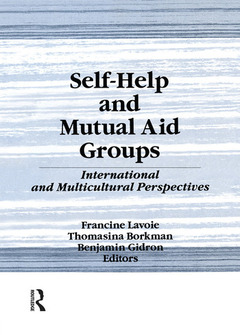Self-Help and Mutual Aid Groups International and Multicultural Perspectives
Auteurs : Lavoie Francine, Gidron Benjamin

Here is new information on the development of international and intercultural research on self-help groups. This book reflects the many developments which have occurred in the field over the past decade, emphasizing empirical research. Self-Help and Mutual Aid Groups provides specific research findings and honed concepts to help health professionals learn more about self-help groups and work effectively with such groups. More countries and ethnic groups are now involved in the self-help movement, and this volume increases knowledge of how different cultures react to and participate in self-help mutual aid and how self-help groups can be adapted to fit different racial or ethnic populations. Self-Help and Mutual Aid Groups explores the definition of self-help, the centrality of culture as a major factor explaining variability in self-help, the development of appropriate methodological tools, and the role and involvement of professionals. It brings together different traditions of research for the study of cross- and intercultural and inter- and intraorganizational aspects of self-help groups. Contributors who represent various disciplines, including psychology, sociology, social work, and nursing, discuss:
- a paradigm for research in self-help
- the development of self-help groups in Japan, Hong Kong, and the former East Germany
- the participation of blacks in Alcoholics Anonymous
- the participation of Mexican Americans in groups for parents of the mentally ill
- relationships between self-help groups and health professionals
- predictors of burnout in self-help group leaders
- characteristics of effective groups
- ways individuals change their world view through self-help participationSelf-Help and Mutual Aid Groups is an informative and helpful resource for self-help researchers and teachers, students, and professionals who want to be more effective in their work with self-help groups across cultural and national lines.
Contents
Preface
- Universal and Particular Attributes of Self-Help: A Framework for International and Intranational Analysis
- Participatory Action Research as a Strategy for Studying Self-Help Groups Internationally
- Self-Help Groups in Japan: Trends and Traditions
- The Development of Self-Help in Germany’s New Provinces (Former East Germany): The Case of Schwerin
- Advocacy on Self-Help for Patients With Chronic Illness: The Hong Kong Experience
- Mexican American and Anglo American Parents of the Mentally Ill: Attitudes and Participation in Family Support Groups
- Are Twelve Step Programs Appropriate for Disenfranchised Groups? Evidence From a Study of Posttreatment Mutual Help Involvement
- Understanding Worldview Transformation in Members of Mutual Help Groups
- Partnerships Between Health Professionals and Self-Help Groups: Meanings and Mechanisms
- Predictors of Burnout Among Self-Help Group Leaders
- Social Climate Correlates of Effectiveness in Alliance for the Mentally Ill Groups
- The Involvement of Self-Help Groups With Mental Health and Medical Professionals: The Self-Helpers’ Perspective
- Workshop on “Good Practice” in the Collaboration Between Professionals and Mutual Aid Groups
- Self-Help Group Participation Among People With Severe Mental Illness
- Conclusion
- Index
- Reference Notes Included
Date de parution : 04-1995
15.6x21.6 cm
Date de parution : 05-2016
14.8x21 cm
Disponible chez l'éditeur (délai d'approvisionnement : 14 jours).
Prix indicatif 56,31 €
Ajouter au panierThème de Self-Help and Mutual Aid Groups :
Mots-clés :
multicultural; perspectives; selfhelp; haworth; press; members; benjamin; gidron; thomasina; borkman; SHGs; Selfhelp Groups; Self-help Group Participants; Pa Rti; Self-help Group Participation; Mental Health Beliefs; Alcohol Severity Score; West Germany; Drug Severity Score; Self-help Group Members; Harbor UCLA Medical Center; Qualitative Participatory Action Research; Mutual Aid Groups; Self-help Group Leaders; Self-help Group Meetings; Self-help Group Activities; Patient Self-advocacy; Self-help Group Membership; Cami; Thomasina Borkman; Support Received; Non-medical Groups; Global Functional Impairment; Professional Involvement; Regular Group Members



